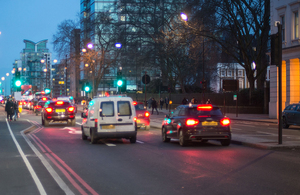Taxi licensing toughened up to protect passengers across England
Councils in England mandated to use a national database that records taxi drivers who have had their licences removed for misconduct.

- robust new rules to clamp down on unfit taxi and private hire vehicle (PHV) drivers and boost passenger safety
- national database will prevent drivers who lose their licence from applying elsewhere without other authorities knowing about previous wrongdoing
- campaign groups and industry welcome action to stop offenders slipping through the net
New measures will safeguard passengers and crack down on unfit taxi and PHV drivers, with tighter checks introduced across local authorities.
Building on existing legislation, councils in England will now be mandated to use a national database to record instances where taxi and PHV drivers have their licences removed for misconduct. This new law will prevent them from simply reapplying for a licence in other areas by alerting the system to concerns about their prior behaviour.
This will ensure passengers can use taxis and PHVs with greater confidence that these modes of transport are safe, helping to strengthen communities and restore pride in towns and high streets across the country.
While the vast majority of taxi and private hire trips are safe and efficient, there have been a small number of reports linking a minority of drivers to incidents of sexual harassment, abuse and poor driving.
Transport Secretary Mark Harper said:
The safety of passengers, especially women and girls, is paramount. That’s why I’m bringing in tough new measures to ensure that when you catch a cab, you can be confident your driver will take you from A to B safely and without incident.
While the vast majority of drivers are hardworking and honest, we’re taking steps to remove the few who abuse their position and pose a risk to passengers.
The step will bring into full force the Taxis and Private Hire Vehicles (Safety and Road Safety) Act 2022 and is being backed by the family of Sian O’Callaghan, who was tragically murdered by a PHV driver in Swindon in 2011, aged 22. Her family has since been campaigning for tougher measures to protect passengers.
Sian’s family said:
To see this law being implemented and rolled out today across all local authorities is testament to Sian. It was in her nature to help others and this means so much to us personally.
Her name is now linked to a drastic improvement in passengers’ safety within taxis and PHVs, while also better protecting hard-working, law-abiding drivers themselves.
The act, introduced last year, was spearheaded by Darlington MP Peter Gibson and has been supported by Ms O’Callaghan’s family and the personal safety charity, Suzy Lamplugh Trust.
Suky Bhaker, CEO, Suzy Lamplugh Trust, said:
We welcome today’s announcement of tighter checks on drivers as an important milestone in steps to achieve this. It is vital that licensing authorities have access to all relevant information to decide if a driver meets licensing safety requirements.
The existing database is already used voluntarily by some local authorities, but only 74% of councils in England are using it.
From today (27 April 2023), use of the database will be compulsory for every driver licence application and the Department for Transport will monitor its use closely. Councils that fail to do the necessary checks could face legal action.
Hosted by the National Anti-Fraud Network, the system records all instances where taxi and PHV driver licences have been refused, suspended or revoked on either safeguarding or road safety grounds.
Improving information-sharing between licensing authorities prevents drivers who could do harm from getting a licence elsewhere without being challenged.
Steve Wright MBE, Chair of the Licensed Private Hire Car Association, said:
This measure will help join up enforcement and compliance nationally between licensing authorities to prevent the unacceptable movement from one authority to another of those who are unfit to be in the sector.
The benefits of the database are already clear to licensing authorities using the system. In Luton, the platform revealed an applicant who previously had their licence removed due to safeguarding concerns. Despite the driver failing to disclose this in their application, the system ensured the licensing authority was aware and the request was rejected as a result.
Elsewhere, the database prevented a driver who had previously assaulted another taxi driver in Southampton from regaining a licence in Winchester.
Today’s announcement forms part of the government’s commitment to support survivors and prioritise, prevent and strengthen the pursuit of those who abuse their position of trust. Alongside the new Grooming Gangs Taskforce to tackle child sexual abuse and exploitation, this measure will weed out unfit drivers and safeguard passengers who rely on these services.
Roads media enquiries
Media enquiries 0300 7777 878
Switchboard 0300 330 3000